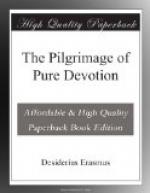womenes affectyones, & I must obaye heres. Me.
If that you had not perfourmyd your vowe, what iopertye
had you be in? Ogy. I graunt, he could not haue
had an accyon ayenst me in ye law, but he myght from
hensforthe be deafe to my vowes, orels pryuyly send
some calamytye or wretchednes amongste my housholde,
yow know well enuffe the maneres of great men. Me.
Tell me now what that same honest ma saynt Iames dothe,
and howe he farythe. Ogy. Moche colder tha he
was wontyd to do. Me. What is the cause of
it? His age? Ogy. Oh you scoffer, yow
|| A iij.|| know wel enoghe that sayntes wax nat olde.
But this new learnynge, whiche runnythe all the world
ouer now a dayes, dothe cause hym to be vysytyd moche
lesse than he was wontyd to be, for if any doo come
thay salute him alonly, but they offre lytle or nothinge,
and say that theyr monaye may bettre be disposyd amongste
pore people. Me. O a wykyd comunicacyon. Ogy.
Ye & so great an Apostle whiche was wotyd to stand
all in precyous stones & gold, now stadythe all of
wodde hauynge before hym skaresly a wax candle. Me.
If it be trew that I here, it is great ioperdy lest
that same chance to all the rest of the sayntes. Ogy.
I thynk it wel, for ther is an epistle abrode whiche
our lady dyd wryte apon the same matter. Me.
What lady? Ogy. She that hathe her name
of a stone.[Our ladi of stone in Raurachia whiche
is a certayne cuntre.] Me. I trawe it is in
Raurachia. Ogy. That same || is it. Me.
yow tell me of a stony lady, But to whome dyd she
wryte? Ogy. The epistle dothe playnely shew
his name. Me. By whome was it sent? Ogy.
No dowbt but by an angell, whiche dyd lay the wrytynges
apo the aultre, wherof he prechythe to whome it was
sent. And lest there shuld be any suspectyo of
crafty couayance in you, you shall se the epistle
wryten with his owne hande. Me. Do you know
so well the hand of thangell whiche is secretary to
our lady? Ogy. Yee why nat? Me. By what
argumet? Ogy. I haue redde that Epithaphe
[Is a scripture wryten on a graue.] of Bede which
was grauyd of the angell: and the letteres agre
in all thynges. I haue redde also ye obligacyo
whiche was sent to saynt Gyles as dothe aper.
Dothe not thes argumentes proue that mater to be good
enoghe. Me. May a man loke apon them? Ogy.
ye and if you wyll swere to kepe it || A iiij.|| preuy.
Me. Oh you shall speake to a stone. Ogy.
Ther be stones now a dayes of that name very slawnderous,
that wyll hyde nothynge. Me. you shall speake
to a domme man, & yow trust nat a stone. Ogy.
Apon ye condycyon I wyll tell it, loke that you here
with bothe youre eyares. Me. So I doo.
[The epistle of our Lady.]




